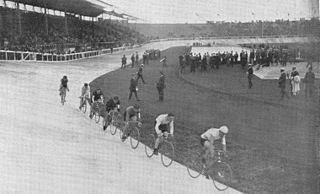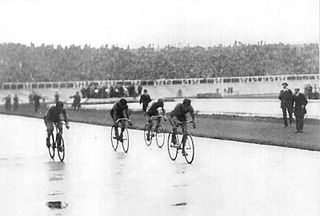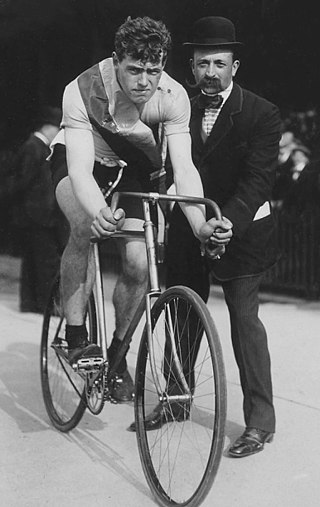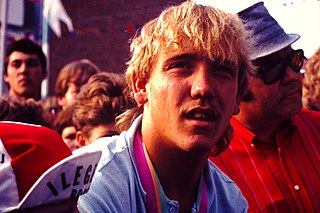
The 1900 Summer Olympics were held as part of the 1900 World's Fair, during which many cycling events were contested. The IOC website currently affirms a total of 3 medal events, after accepting, as it appears, the recommendation of Olympic historian Bill Mallon regarding events that should be considered "Olympic". These additional events include the men's points race. Thus, three cycling events are considered Olympic events. These three competitions were held between 9 September and 16 September 1900. The cycling part of the World's Fair included 250 competitors, 160 of them French. In the sprint and 25 km events, 72 competitors, all men, from seven nations competed.

The men's points race in cycling at the 2004 Summer Olympics consisted of a 160 lap points race with 16 sprints where points were awarded. The event was held on 24 August 2004 at the Athens Olympic Velodrome. There were 23 competitors from 23 nations, with each nation limited to one cyclist in the event. The event was won by Mikhail Ignatiev of Russia, the nation's first victory in the men's points race. Spain's Joan Llaneras, the defending champion, took silver; he was the first and only person to win multiple medals in the relatively short-lived points race, and ended with three medals after another gold in 2008. Guido Fulst of Germany took bronze, the first medal in the event for that nation since 1900.

Cycling has been contested at every Summer Olympic Games since the birth of the modern Olympic movement at the 1896 Summer Olympics, at which a road race and five track events were held. Mountain bike racing entered the Olympic programme at the Atlanta Olympics, followed by BMX racing in 2008 and freestyle BMX in 2020. Before the 2020 Summer Olympics, all events were speed races, but the 2020 programme featured BMX freestyle for the first time.

The men's time trial was one of 5 track cycling events on the Cycling at the 1896 Summer Olympics programme. It was the fourth event on the cycling schedule and was held on 11 April. The first time trial competition was the only time that Olympic time trials were held over the distance of one-third of a kilometre; when the event returned to the programme at the 1928 Summer Olympics the distance was set at one kilometre.

The men's sprint was one of the five track cycling events on the Cycling at the 1896 Summer Olympics programme. It was held on 11 April as the second event on the schedule. It was held over the distance of 2 kilometres, or six laps of the track. The event was won by Paul Masson of France, with his teammate Léon Flameng earning bronze. Stamatios Nikolopoulos of Greece took silver

The men's 10 kilometres was one of the five track cycling races on the Cycling at the 1896 Summer Olympics programme. It was held on 11 April and comprised 30 laps of the track. The 1896 Games was the only time that the 10 kilometres track race was part of the cycling program at an Olympic Games. Six cyclists from four nations competed. The event was won by Paul Masson of France, the second of his three victories that day. His countryman Léon Flameng finished second, while Austrian Adolf Schmal was third.

The men's 100 kilometres was one of five track cycling events on the Cycling at the 1896 Summer Olympics programme. It was the first race held, on 8 April. It required cyclists to complete 300 circuits of the track. Nine cyclists from five nations competed. The event was won by Léon Flameng of France, with Georgios Kolettis of Greece coming in second.

The men's 12 hour race was one of five track cycling events on the Cycling at the 1896 Summer Olympics programme. It was the final event of the 1896 Summer Olympics, ending at 5 p.m. on 13 April. Seven cyclists from four nations started. The event was won by Adolf Schmal of Austria, the only gold medal in cycling ever won by the nation, until Anna Kiesenhofer's win in the 2020 Women's Road Race. Schmal lapped silver medalist Frederick Keeping of Great Britain early, winning by that lap as the two were the only riders to finish. The 12 hour race was the last event to finish at the 1896 Games.

The men's sprint was one of the three cycling events, all track cycling, now regarded as "Olympic" on the Cycling at the 1900 Summer Olympics programme. It was held on 11 September and 13 September. The sprint, a 2000-metre race with 1000-metre heats, was conducted in four rounds. 69 of the 72 cyclists competed in the sprint, including cyclists from all six competing nations. The event was won by Albert Taillandier of France, with his countryman Fernand Sanz in second place. John Henry Lake of the United States won the nation's first cycling medal with his bronze.

The men's 20 kilometres was one of seven track cycling events on the Cycling at the 1908 Summer Olympics programme. Its distance was the second longest of the individual event distances. Each nation could enter up to 12 cyclists.

The men's 100 kilometres was one of seven track cycling events on the Cycling at the 1908 Summer Olympics programme. Its distance was the longest of the individual event distances. A challenge cup was presented by the Prince of Wales to the winner. There were 43 competitors from 11 nations. Each nation could enter up to 12 cyclists. The event was won by Charles Henry Bartlett of Great Britain, with his countryman Charles Denny finishing second. Octave Lapize earned bronze, making France the only nation to have medalists at both appearances of the 100 kilometres race.

The men's 1000 metre sprint was one of seven track cycling events on the Cycling at the 1908 Summer Olympics programme. Its distance was the second shortest of the individual event distances. Each nation could enter up to 12 cyclists.

The men's points race was an event at the 1984 Summer Olympics in Los Angeles, California, for which the final was held on August 3, 1984. There were 43 participants from 25 nations. Each nation was limited to 2 cyclists. 24 cyclists competed in the final after two semifinals. The event was won by Roger Ilegems of Belgium, with Uwe Messerschmidt taking silver and José Youshimatz of Mexico bronze. It was the first medal in the event for each nation, none of which had competed in the previous edition in 1900.

The men's points race was an event at the 1988 Summer Olympics in Seoul, South Korea, for which the final was held on 24 September 1988. There were 34 participants from 34 nations, with 24 cyclists competing in the final. Each nation was limited to 1 cyclist in the event. The event was won by Dan Frost of Denmark, with Leo Peelen of the Netherlands taking silver and Marat Ganeyev of the Soviet Union bronze. It was the first medal in the men's points race for each of the three nations.

The men's points race was an event at the 1992 Summer Olympics in Barcelona, Spain. There were 38 competitors from 38 nations, with 24 cyclists competing in the final. Each nation was limited to one cyclist in the event. The event was won by Giovanni Lombardi of Italy, the nation's first victory in the event since 1900 and second victory overall; Italy was the first nation to have two wins in the men's points race. Léon van Bon gave the Netherlands its second consecutive silver in the event. Bronze went to Cédric Mathy of Belgium.

The men's points race was an event at the 1996 Summer Olympics in Atlanta, Georgia. There were 28 participants from 28 nations, with 24 cyclists completing the final, which was held on July 28, 1996. Each nation was limited to one cyclist in the event. The event was won by Silvio Martinello of Italy, the nation's second consecutive and third overall victory in the men's points race. Silver went to Brian Walton of Canada and bronze to Stuart O'Grady of Australia; it was the first medal in the event for both nations.

The men's points race was an event at the 2000 Summer Olympics in Sydney, Australia. There were 23 participants from 23 nations competing in the final, which was held on 20 September 2000. Each nation was limited to one cyclist in the event. The event was won by Joan Llaneras of Spain, the nation's first medal in the men's points race. Silver went to Milton Wynants of Uruguay and bronze to Aleksei Markov of Russia; those nations also earned their first medals in the event.

The men's points race at the 2008 Summer Olympics took place on August 16 at the Laoshan Velodrome. There were 23 competitors from 23 nations. The event was won by Joan Llaneras of Spain, his second victory in the points race and third consecutive medal in the event. Llaneras was the only person, of any gender, to win multiple medals in the points race, which is no longer on the Olympic programme. His two gold medals made Spain only the second nation to win multiple golds in the men's event; Italy had three. Silver went to Roger Kluge of Germany. Great Britain earned its first medal in the men's points race with Chris Newton's bronze.

The men's track time trial in Cycling at the 1992 Summer Olympics was a time trial race in which each of the thirty-two cyclists attempted to set the fastest time for four laps of the track. The race was held on Monday, July 27 at the Velòdrom d'Horta. Adler Capelli rode a bike that allowed for a single gear change, a first for an Olympic track event. There were 32 competitors from 32 nations, with each nation limited to one cyclist. The event was won by José Manuel Moreno of Spain, the nation's first medal in the men's track time trial. The United States also earned its first medal in the event, with Erin Hartwell's bronze. Shane Kelly took Australia's second consecutive silver medal in the track time trial.

The men's points race, or “Course de Primes,” was a track cycling event at the 1900 Summer Olympics. The competition was held on 15 September 1900 at the Vélodrome de Vincennes. There were 13 competitors from 3 nations. The event was won by Enrico Brusoni of Italy, who won 5 of the laps including the last one. Karl Duill of Germany placed second, with Louis Trousselier of France third.
















